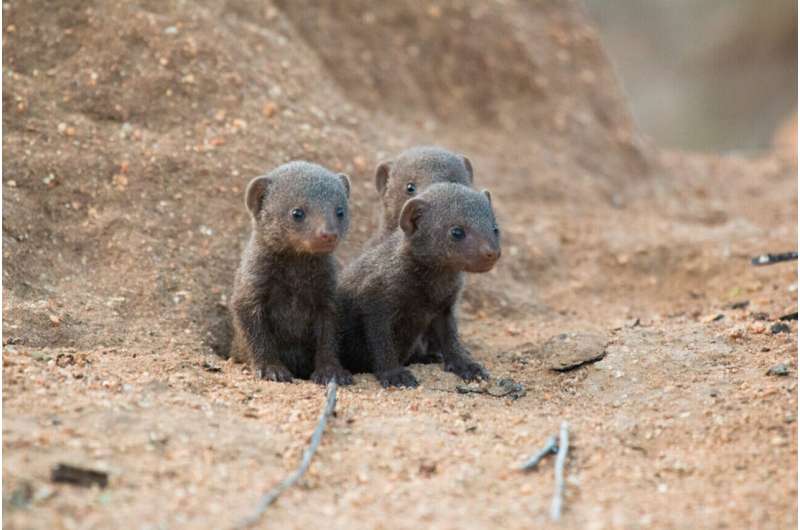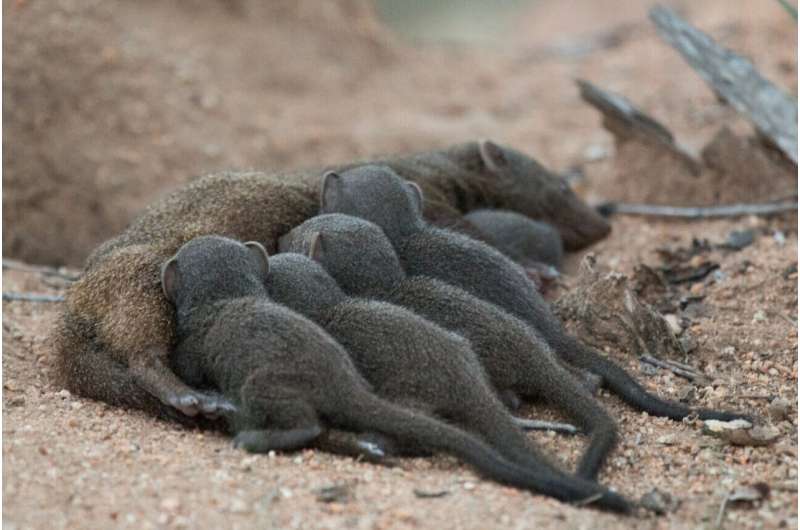
Animal offspring may survive better when their groups are in greater conflict with rival factions, research from the University of Bristol has shown for the first time.
Battles between competing groups can lead to serious injury or death, and intergroup conflict has always been thought to have a negative effect on reproductive success.
But findings published today in the Proceedings of the Royal Society B turn that long-held belief on its head.
Using a decade of life-history data from a wild population of dwarf mongooses, University of Bristol researchers found that pup survival rate actually increased when the cumulative threat of conflict with rival groups was greater.
Lead author Dr. Amy Morris-Drake, from Bristol’s School of Biological Sciences, said, “Groups engaged in more intergroup interactions did not produce more young. Rather, a greater threat from outsiders was associated with a higher survival likelihood of pups once they emerged from the breeding burrow.”
The team conducted detailed behavioral observations of the study groups in South Africa to investigate what might drive the improved pup survival. They found that when rivals or indicators of their recent presence are encountered, adults increase their sentinel (raised guarding) behavior.

Senior author Professor Andy Radford, also from Bristol, explained, “Increased sentinel behavior is likely an attempt to gather more information about the other group. But sentinels also detect predatory threats and warn groupmates of danger, so vulnerable pups are potentially safer as a consequence.”
The general expectation is that intergroup conflict will have negative consequences for reproductive success. In a rare previous study, for example, chimpanzee fetal survival was lower and inter-birth intervals were longer when there was a greater threat level from other groups.
Prof Radford said, “We are not suggesting that conflict has a direct positive effect on breeding success. Instead, there could be byproduct benefits of behavioral changes—such as increased vigilance—that result from an increased threat level.”
Dr. Morris-Drake concluded, “Our work suggests that if we are to understand the importance of warfare on societies, we must consider threats as well as actual fights. Moreover, we need to investigate not just actions on the battleground but the wider consequences too.”
Dwarf mongooses are Africa’s smallest carnivore, living in cooperatively breeding, territorial groups of 5–30 individuals. The work was conducted as part of the Dwarf Mongoose Research Project, which has studied habituated wild groups continuously since 2011. The study animals are individually marked with blonde hair dye, are trained to climb onto a balance scale to weigh themselves, and can be watched from a few feet away as they go about their natural behavior in ecologically valid conditions.
More information:
A positive effect of cumulative intergroup threat on reproductive success, Proceedings of the Royal Society B: Biological Sciences (2023). DOI: 10.1098/rspb.2023.1853. royalsocietypublishing.org/doi … .1098/rspb.2023.1853
Citation:
Increased threat of conflict enhances mongoose pup survival: Study challenges long-held belief on reproductive success (2023, November 14)
retrieved 14 November 2023
from https://phys.org/news/2023-11-threat-conflict-mongoose-pup-survival.html
This document is subject to copyright. Apart from any fair dealing for the purpose of private study or research, no
part may be reproduced without the written permission. The content is provided for information purposes only.
